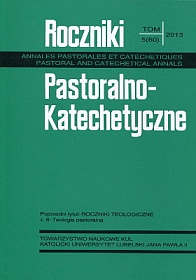Methodological Paradigms in the Contemporary Pastoral Theology
Abstract
Theological fields of study are commonly divided into historical, systematic, and practical ones. Pastoral theology belongs undoubtedly to the last group. What is more, it does really cooperate with those fields, relying mostly on the normative factors in order to reach its own conclusions. Not to mention, a set of deductive methods that pastoral theologians use and which are typical of the historical and systematic theology. However, those deductive methods are ineffective in the context of the challenges that the contemporary pastoral theology must face. The aim of such a theology is to create models of redemptory activity of individuals as well as various groups of Christians. The models must meet the latest socio-cultural demands. In order to propose models of effective redemptory activity, it is necessary to analyze regularly the dynamic social reality of the Church. This in turn demands using inductive methods. The difficulty to carry out such new research in pastoral theology, also known as practical theology, lies in the appropriate combination of both deductive and inductive methods. In this context, the scientific question of methodological paradigms in pastoral theology is raised.
According to Cardijn's paradigm, the redeeming situation should be recognized, then judged in line with theological criteria, and, on the basis of this confrontation, draw pastoral conclusions about the current activity of the Church. The paradigm of three-stage theological-pastoral analysis is used often in Poland, especially in the KUL (John Paul II Catholic University of Lublin) environment, the foundations of which were laid by the authors representing ecclesiological fields of pastoral theology (K. Rahner, H. Schuster, F. Klostermann). The paradigm of analysis of praxeological ministerial activities refers to the general theory of action, in which the particular elements of actions are analysed, i.e. the aim, object, subject (the environment), methods, means, as well as historical, social and cultural conditions, etc. A good command of methodological paradigms seems to be indispensable to carry out studies and start reflection in pastoral theology.
References
Hiltner S.: Preface to Pastoral Theology. New York 1968.
Hochstaffl J.: Die Konzeption von Praxis. In: Handbuch Praktische Theologie. Ed. H.Haslinger. Bd. 1. Mainz 1999 pp. 318-332.
Kamiński R.: Działalność zbawcza Kościoła w teorii i praktyce pastoralnej. Lublin 2007 pp. 7-39.
Kamiński R.: Metody teologii pastoralnej. In: Teologia pastoralna. Ed. R. Kamiński. Vol. 1. Lublin 2000 pp. 21-26.
Kamiński R.: Problemy dyskutowane w teologii pastoralnej. „Roczniki Teologiczne” 48:2001 issue 6 pp. 5-18.
Klein S.: Methodische Zugänge zur sozialen Wirklichkeit. In: Handbuch Praktische Theologie. Ed. H. Haslinger. Bd. 1. Mainz 1999 pp. 248-259.
Przybecki A.: Pojęcie modelu duszpasterstwa w teologii pastoralnej. „Teologia Praktyczna” 9:2008 pp. 127-135.
Przygoda W.: Model pastoralny. In: Encyklopedia katolicka. Ed. S. Wilk, E. Ziemann [et al.]. Lublin 2008 vol. 12 col. 1487-1489.
Mette N.: Theorie der Praxis. Wissenschaftsgeschichtliche und methodologische Untersuchungen zur Theorie-Praxis Problematik innerhalb der praktischen Theologie. Düsseldorf 1978.
Mierzwiński B.: Teologia pastoralna czy teologia praktyczna. Spór o nazwę czy okoncepcję? „Ateneum Kapłańskie” 144:2005 no 576 pp. 224-233.
Müller J.: Pastoraltheologie. Ein Handbuch für Studium und Seelsorge. Graz−Wien−Köln 1993 pp. 74-81.
Sakowicz E.: Aggiornamento. W: Leksykon teologii pastoralnej. Ed. R. Kamiński, W.Przygoda, M. Fiałkowski. Lublin 2006 pp. 32-34.
Zerfaß R.: Praktische Theologie als Handlungswissenschaft. W: Praktische Theologie heute. Ed. F. Klostermann, R. Zerfaß. München−Mainz 1974 pp. 164-177.

